
John William Coltrane was an American jazz saxophonist, bandleader and composer. He is among the most influential and acclaimed figures in the history of jazz and 20th-century music.
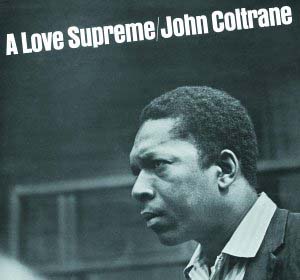
A Love Supreme is an album by the jazz saxophonist and composer John Coltrane. He recorded it in one session on December 9, 1964, at Van Gelder Studio in Englewood Cliffs, New Jersey, leading a quartet featuring pianist McCoy Tyner, bassist Jimmy Garrison and drummer Elvin Jones.
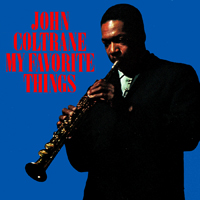
My Favorite Things is a studio album by the jazz musician John Coltrane. It was released in March 1961 on Atlantic Records. It was the first album to feature Coltrane playing soprano saxophone. An edited version of the title track became a hit single that gained popularity in 1961 on radio. The record became a major commercial success.
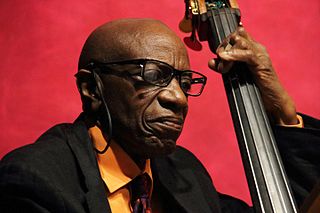
Reginald "Reggie" Workman is an American avant-garde jazz and hard bop double bassist, recognized for his work with both John Coltrane and Art Blakey, in addition to Alice Coltrane, Mal Waldron, Max Roach, Archie Shepp, Trio Three, Trio Transition, the Reggie Workman Ensemble, and collaborative projects with dance, poetry and drama.

Olé Coltrane is a studio album by the jazz musician and composer John Coltrane. It was released in November 1961 through Atlantic Records. The album was recorded at A&R Studios in New York, and was the last of Coltrane's Atlantic albums to be made under his own supervision.

Live in Japan is a live album by American saxophonist John Coltrane, recorded for radio broadcast during his only Japanese tour in July 1966 at two Tokyo venues, Shinjuku Kosei Nenkin Hall and Sankei Hall. The recordings feature his last group, a quintet featuring Coltrane, his wife/pianist Alice, saxophonist/bass clarinetist Pharoah Sanders, bassist Jimmy Garrison and drummer Rashied Ali.

Ascension is a jazz album by John Coltrane recorded in June 1965 and released in 1966. It is considered a watershed in Coltrane's work, with the albums recorded before it being more conventional in structure and the albums recorded after it being looser, free jazz inspired works. In addition, it signaled Coltrane's interest in moving away from the quartet format. AllMusic called it "the single recording that placed John Coltrane firmly into the avant-garde".

Coltrane's Sound is an album credited to the jazz musician John Coltrane, recorded in 1960 and released in 1964 on Atlantic Records, catalogue SD 1419. It was recorded at Atlantic Studios during the sessions for My Favorite Things, assembled after Coltrane had stopped recording for the label and was under contract to Impulse! Records. Like Prestige and Blue Note Records before them, as Coltrane's fame grew during the 1960s Atlantic used unissued recordings and released them without either Coltrane's input or approval.

Africa/Brass is a studio album by the jazz saxophonist and composer John Coltrane. It was released on September 1, 1961 through Impulse! Records. Coltrane's working quartet is augmented by a larger ensemble that brings the total to twenty-one musicians. Its big band sound, with the unusual instrumentation of French horns and euphonium, presented music very different from anything that had been associated with Coltrane to date. While critics originally gave it poor ratings, more recent jazz commentators have described it as "amazing" and as a "key work in understanding the path that John Coltrane's music took in its final phases." It is Coltrane's first release for Impulse!.

Bags & Trane is an album credited to jazz musicians Milt Jackson and John Coltrane, released in 1961 on Atlantic Records, catalogue SD 1368. Taking its title from Jackson and Coltrane's nicknames, it is the only collaborative record by the two, although only Jackson contributed original compositions. In actuality, the album belongs in Jackson's discography, as he was the session leader and still signed to Atlantic under the auspices of the Modern Jazz Quartet, and not in that of Coltrane, who had left the label for Impulse Records at the time of this album's first issue. However, like Prestige Records, as Coltrane's profile grew after he had stopped recording for the label, Atlantic released them with Coltrane's name more prominently displayed.
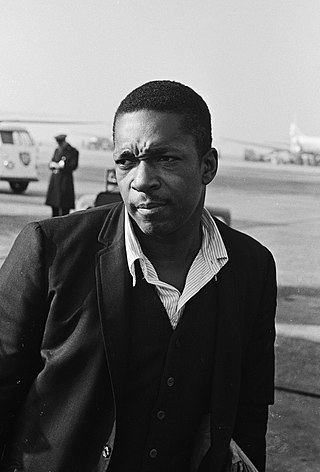
This article presents the discography of the American jazz saxophonist and bandleader John Coltrane (1926–1967).

Coltrane Jazz is a studio album by the jazz musician John Coltrane. It was released in early 1961 on Atlantic Records. Most of the album features Coltrane playing with his former Miles Davis bandmates, pianist Wynton Kelly, bassist Paul Chambers and drummer Jimmy Cobb during two sessions in November and December, 1959. The exception is the track "Village Blues", which was recorded October 21, 1960. "Village Blues" comes from the first recording session featuring Coltrane playing with pianist McCoy Tyner and drummer Elvin Jones, who toured and recorded with Coltrane as part of his celebrated "classic quartet" from 1960 to 1965.

Coltrane "Live" at the Village Vanguard is a live album by the jazz musician and composer John Coltrane. It was released in February 1962 through Impulse Records. It is the first album to feature the members of the classic quartet of Coltrane with McCoy Tyner, Jimmy Garrison, and Elvin Jones, as well as the first Coltrane live album to be issued. In contrast to his previous album for Impulse!, this one generated much turmoil among both critics and audience alike with its challenging music.
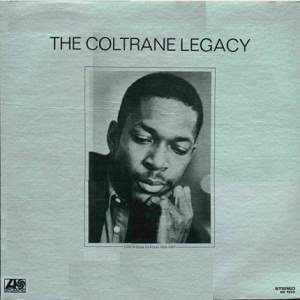
The Coltrane Legacy is a compilation album credited to jazz musician John Coltrane, released in 1970 on Atlantic Records, catalogue SD 1553. Issued posthumously, it consists of outtakes from recording sessions which yielded the albums Olé Coltrane, Coltrane Plays the Blues, Coltrane's Sound, and Bags & Trane. All selections were previously unreleased.

Selflessness Featuring My Favorite Things is a posthumous album by jazz musician John Coltrane, released in 1969. The album juxtaposes two tracks recorded live at the 1963 Newport Jazz Festival with a single track ("Selflessness") recorded in a studio in Los Angeles in 1965.

The Last Giant: Anthology is an album by jazz musician John Coltrane. This 2-CD set compiles recordings spanning the years 1946–1967, and was released by Rhino Records in 1993.

Four for Trane is a studio album by tenor saxophonist Archie Shepp released on Impulse! Records in 1965. Four of the five tracks were composed and originally recorded by John Coltrane and rearranged by Shepp and trombonist Roswell Rudd. The other featured players are trumpeter Alan Shorter, alto saxophonist John Tchicai, bassist Reggie Workman and drummer Charles Moffett. Coltrane himself co-produced the album alongside Bob Thiele. The album was Shepp's first release for Impulse!

The Best of John Coltrane is a 1970 compilation album released by Atlantic Records collecting recordings made by jazz saxophonist John Coltrane. The album was released shortly after his death as a part of the "Atlantic Jazz Anthology"—a series of greatest hits compilations for Atlantic jazz artists—and features performances from his brief period recording for Atlantic with new liner notes by jazz journalist Nat Hentoff.
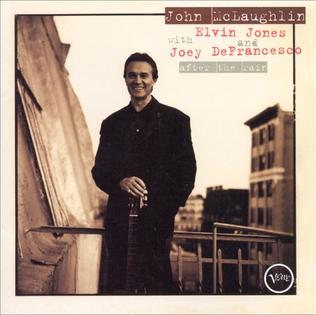
After the Rain is a jazz album by John McLaughlin, released in 1995 on Verve Records. The album reached number 9 in the Billboard Top Jazz Albums chart 1995. It features organist Joey DeFrancesco and veteran drummer Elvin Jones.
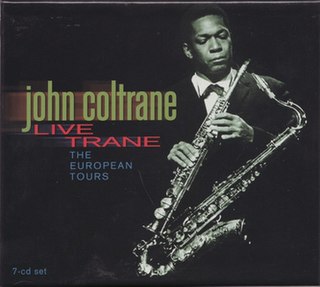
Live Trane: The European Tours is a 7–CD compilation album by American saxophonist John Coltrane containing music recorded live during 1961, 1962, and 1963 European tours, all of which took place under the auspices of Norman Granz's Jazz at the Philharmonic programs. The album, which was released in 2001 by Pablo Records, features Coltrane on tenor and soprano saxophones along with pianist McCoy Tyner, bassists Jimmy Garrison and Reggie Workman, and drummer Elvin Jones. In addition, Eric Dolphy is heard on alto saxophone, bass clarinet, and flute on a number of tracks.



















